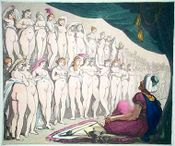Template:Pictorial-Islam-options: Difference between revisions
Jump to navigation
Jump to search
| [checked revision] | [checked revision] |
mNo edit summary |
mNo edit summary |
||
| Line 1: | Line 1: | ||
<noinclude>Also see: [[Template:Pictorial-Islam]]</noinclude><!-- HELP NOTES: Each option tag handles one random story --><choose> | <noinclude>Also see: [[Template:Pictorial-Islam]]</noinclude><!-- HELP NOTES: Each option tag handles one random story --><choose> | ||
<option weight="1">{{Pictorial-Islam|1=The Qur'an and Mountains|2=[[File:Andestru.gif|270px|link=The Quran and Mountains]]|3=Many articles have been written in response to the claim that the Qur'an is validated by the geological science concerning mountains. This article adds to these by addressing several newer points that have been adopted to justify the original claim or to evade contrary scientific evidence. | |||
The claim that mountains are pegs is untrue as not all mountains have "peg-like" roots. The claim that mountains stabilize the crust or the earth is (at best) unproven. There is no scientific evidence for this assertion, therefore the Qur'an cannot be validated by scientific evidence that does not exist. ([[The Quran and Mountains|''read more'']])}}</option> | |||
Revision as of 11:36, 7 February 2014
Also see: Template:Pictorial-Islam
|
